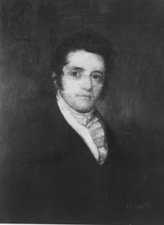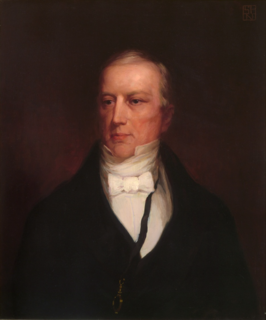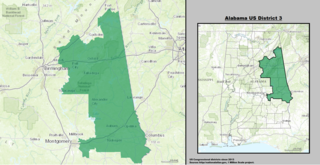| |||||||||||||||||
| |||||||||||||||||
| |||||||||||||||||
| Elections in Alabama |
|---|
 |
The 1829 Alabama gubernatorial election was an uncontested election held on August 3, 1829, to elect the governor of Alabama. Jacksonian candidate Gabriel Moore ran unopposed and so won 100% of the vote.
| |||||||||||||||||
| |||||||||||||||||
| |||||||||||||||||
| Elections in Alabama |
|---|
 |
The 1829 Alabama gubernatorial election was an uncontested election held on August 3, 1829, to elect the governor of Alabama. Jacksonian candidate Gabriel Moore ran unopposed and so won 100% of the vote.
| Party | Candidate | Votes | % | ±% | |
|---|---|---|---|---|---|
| Jacksonian | Gabriel Moore | 10,956 | 100% | ||
| Majority | 10,956 | 100% | |||
Samuel B. Moore was the sixth Governor of the U.S. state of Alabama from March 3 to November 26, 1831. He was president of the Alabama Senate when Governor Gabriel Moore was elected to the United States Senate, and so became governor when Gabriel Moore resigned to take the seat.

Gabriel Moore was a Democratic-Republican, later Jacksonian and National Republican politician and fifth governor of the U.S. state of Alabama (1829–1831).

John Malcolm Patterson was an American politician, who, having never stood for public office before, at 33, served one term as Attorney General of Alabama, from 1955 to 1959, and at 37, served one term as the 44th Governor of the U.S. state of Alabama from 1959 to 1963.

In the 1828 and 1829 United States House of Representatives elections, while Jacksonians soundly took control of the presidency, with Andrew Jackson's victory, they greatly increased their majority in Congress. Outgoing President John Quincy Adams's unpopularity played a major role in the Jacksonian pick-up, as did the perception of the Anti-Jacksonian Party as urban and elitist. Major increases in suffrage also heightened Jacksonian wins, as newly enfranchised voters tended to associate with Jacksonian principles. The Anti-Masonic Party, a single issue faction based on distrust of Freemasonry, became the first third party in American history to garner seats in the House.

Alabama's 3rd congressional district is a United States congressional district in Alabama that elects a representative to the United States House of Representatives. It is based in east central Alabama and encompasses portions of Montgomery and the entirety of Calhoun, Chambers, Cherokee, Clay, Cleburne, Lee, Macon, Randolph, Russell, St. Clair, Talladega, and Tallapoosa counties.

Roy Stewart Moore is an American politician, lawyer, and jurist who served as the 27th and 31st chief justice of the Supreme Court of Alabama from 2001 to 2003 and again from 2013 to 2017, each time being removed from office for judicial misconduct by the Alabama Court of the Judiciary. He was the Republican nominee in the 2017 U.S. Senate special election in Alabama to fill the seat vacated by Jeff Sessions, but was accused by several women of sexual misconduct and lost to Democratic candidate Doug Jones. Moore ran unsuccessfully for the United States Senate in 2020.

Kay Ellen Ivey is an American politician serving as the 54th and incumbent governor of Alabama since 2017. Originally a conservative Southern Democrat, Ivey became member of the Republican Party in 2002. She was the 38th Alabama state treasurer from 2003 to 2011 and the 30th lieutenant governor of Alabama from 2011 to 2017.

The 2010 Alabama gubernatorial election took place on November 2, 2010. Incumbent Republican Governor Bob Riley was term limited and unable to seek re-election. The party primaries were held on June 1, 2010, with a Republican runoff on July 13. In the general election, Republican Robert J. Bentley defeated Democrat Ron Sparks.

The 2017 United States Senate special election in Alabama took place on December 12, 2017, to fill a vacancy in the U.S. Senate through the end of the term ending on January 3, 2021, arising from the resignation on February 8, 2017, of Jeff Sessions to serve as the 84th United States Attorney General. Democratic candidate Doug Jones defeated Republican candidate Roy Moore by a margin of 21,924 votes (1.63%). Jones became the first Democrat to win a U.S. Senate seat in the state since 1992.

The 1859 Alabama gubernatorial election took place on August 1, 1859, in order to elect the governor of Alabama. Democrat Andrew B. Moore won his second term as governor.

The 1857 Alabama gubernatorial election took place on August 3, 1857, in order to elect the governor of Alabama. Democrat Andrew B. Moore won his first term as governor. John A. Winston did not run because he was term-limited.

The 1825 Alabama gubernatorial election was an uncontested election held on August 1, 1825, to elect the governor of Alabama. Jacksonian candidate John Murphy ran unopposed and so won 100% of the vote.

The 1827 Alabama gubernatorial election was an uncontested election held on August 6, 1827, to elect the governor of Alabama. Jacksonian candidate John Murphy ran unopposed and won 99.25% of the vote. Various write-in candidates made up the other 0.75%.

The 1831 Alabama gubernatorial election was an election held on August 1, 1831, to elect the governor of Alabama. Jacksonian candidate John Gayle beat the incumbent Jacksonian governor Samuel B. Moore and National Republican candidate Nicholas Davis with 55.01% of the vote.

The 1833 Alabama gubernatorial election was an uncontested election held on August 5, 1833, to elect the governor of Alabama. Democratic candidate John Gayle stood unopposed and so was elected with 100% of the vote.

The 1835 Alabama gubernatorial election was an election held on August 3, 1835, to elect the governor of Alabama. Democratic candidate Clement Comer Clay beat Whig candidate Enoch Parsons with 65.44% of the vote.

The 1837 Alabama gubernatorial election was an election held on August 7, 1837, to elect the governor of Alabama. Democratic candidate Arthur P. Bagby beat Anti-Van Buren candidate Samuel W. Oliver with 45.21% of the vote.

The 1839 Alabama gubernatorial election was an election held on August 3, 1839, to elect the governor of Alabama. Incumbent Democratic Governor Arthur P. Bagby defeated Whig candidate Arthur F. Hopkins with 92.29% of the vote.

United States gubernatorial elections were held in 1900, in 34 states, concurrent with the House, Senate elections and presidential election, on November 6, 1900.
The 1829 Rhode Island gubernatorial election was an uncontested election held on April 15, 1829 to elect the Governor of Rhode Island. James Fenner, the incumbent governor and Jacksonian Party nominee, was the only candidate and so won with 100% of the vote.